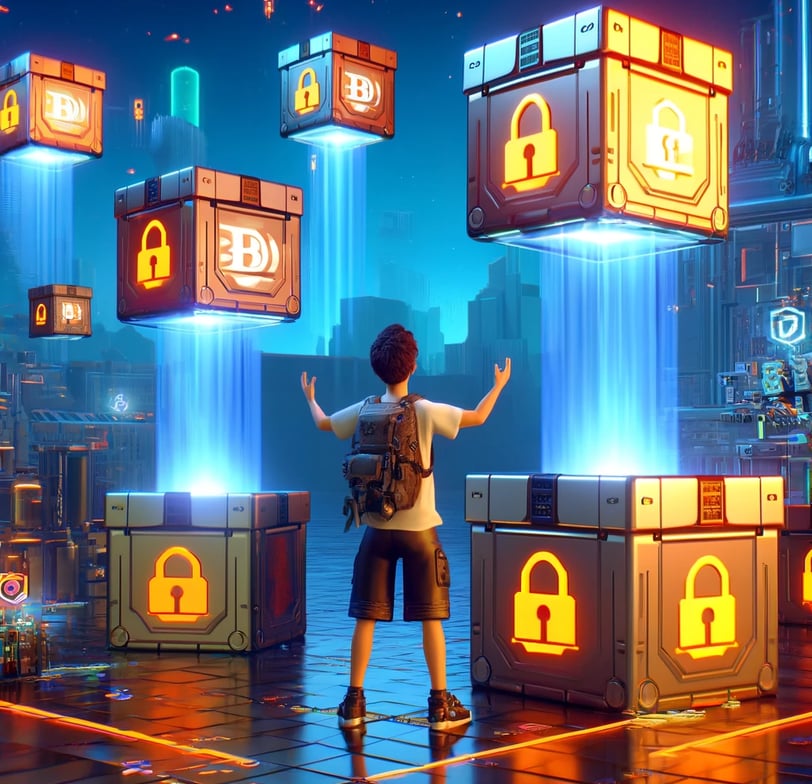Can Blockchain Gaming Offer an Ethical Solution to Microtransactions and Loot Boxes?
A brief look at a potential solution to microtransactions and loot boxes utilizing blockchain and web 3.
GAMINGBLOCKCHAIN
SOL Spark
4/28/20243 min read


Following our recent exploration of the ethical dilemmas presented by microtransactions and loot boxes in video games, the conversation naturally progresses to potential solutions. Blockchain technology, often hailed for its transparency and security, is emerging as a promising contender. Could blockchain gaming redefine the landscape of in-game purchases and create a fairer environment for players? This post delves into how blockchain could address the ethical concerns previously discussed.
Blockchain Basics in Gaming
Blockchain technology integrates principles of decentralization and cryptographic recording to foster transparency and player empowerment. In gaming, this translates into players having verifiable ownership of in-game assets, from skins and weapons to entire characters, all stored on a blockchain as non-fungible tokens (NFTs). This system not only ensures that players can prove ownership but also potentially trade their assets in a secure, peer-to-peer marketplace without intermediary oversight.
Potential Solutions to Ethical Issues
Transparent Transactions: Blockchain provides a public ledger of all transactions. This transparency can help eliminate hidden probabilities and obscured costs associated with loot boxes. Players can see exactly what they are buying or earning and understand the value of their purchase or reward.
True Ownership and Control: By using blockchain to tokenize in-game assets, players gain real ownership over their digital purchases, unlike traditional games where content can be modified or removed by developers at any time. This ownership could also extend to the resale of items, allowing players to regain value from their investments.
Reducing Exploitative Practices: Blockchain's potential for creating a more balanced economy could lead to a reduction in exploitative practices. If players own their assets and can trade them, the need for purchasing numerous loot boxes for random items decreases. Additionally, smart contracts could be employed to ensure that game developers create fair, predictable rules for acquiring in-game content.
Another potential feature that can be integrated is the idea of having airdrops that can be sent to players through interaction of different in game events, tasks and challenges that can reward those that complete said challenges with new tokens, passes, VIP access to beta testing, and more. When it comes to the tokenization side of things in this regard, it shows that rewarding commitment will aid with community retention and the attraction of new players into the ecosystem.
While blockchain presents solutions, it also comes with its own set of challenges:
Environmental Concerns: The energy consumption associated with blockchain, particularly those that require extensive computational work, is significant. Any adoption in gaming must consider the environmental impact of increased blockchain use.
Market Volatility: The value of blockchain assets can be highly volatile. If in-game assets are bought and sold in cryptocurrencies, their changing value could pose new risks for players.
Complexity and Accessibility: Introducing blockchain adds a layer of complexity to gaming. Players might need to manage digital wallets and understand new concepts, which could make gaming less accessible to casual players.
Another fact that must be taken into consideration is the type of consensus mechanism that would determine the possibility of mining a network's token through simply playing the game, getting rewarded in increments after playing a match or attaining a certain level of prestige. This would also be a challenge that adds to the complexity of said project.
Industry Response and Player Reception
Early adopters in the blockchain gaming space, such as games like "Axie Infinity" and "Decentraland," have shown that there is substantial interest in blockchain-based games. However, these games also illustrate the challenges of balancing a new economic model with enjoyable gameplay. The industry’s response has been mixed, with some embracing the technology and others cautioning against its potential to complicate gaming further.
Blockchain technology offers intriguing possibilities for addressing some of the ethical concerns associated with microtransactions and loot boxes. By providing transparency, true ownership, and a potentially fairer economic system, blockchain could help reshape the future of in-game purchases. However, it is not a panacea. As the technology evolves and time progresses, so too must our approaches to integrating it into gaming. The transition to blockchain gaming should be managed carefully to ensure it enhances the gaming experience without sacrificing the joy and accessibility that make games so universally beloved.
As each day passes, the possibility of the OASIS becoming a reality draws closer and closer.
